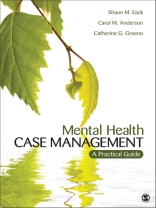Mental Health Case Management: A Practical Guide represents the first modern guide designed to provide students and practitioners with a grounded and practical tutorial on the key functions of a case manager serving adults with severe mental illness. The guide is purposely devoid of extensive theoretical and historical discourse, and rather focuses on a direct and to-the-point approach that time-pressed readers will appreciate when learning the fundamentals of providing mental health case management. Within this work, readers will learn the ABC′s of mental health case management ranging from likely psychiatric conditions their clients will experience to working with the local and federal disability systems. This information is captured within a strengths-based, recovery-oriented framework that places empowerment and the dignity of the client being served at the forefront of the delivery of excellent care, and is intended to be augmented with field experience and close supervision by expert case managers. By the end of reading this guide, students and practitioners should have a clear understanding of the foundation principles of mental health case management and knowledge of how to implement these principles into effective practice.
Table of Content
Medications for Managing the Symptoms of Severe Mental Illness
Resource Brokering: The Big Two
Managing Crises as a Case Manager
Identifying and Managing Substance Use Problems
Comorbid Health Problems
Helping Clients Find Work and Stay Employed
Taking Care of Yourself
About the author
Shaun M. Eack, Ph.D. is an Assistant Professor at the University of Pittsburgh School of Social Work. Dr. Eack is a mental health intervention researcher who has had over a decade of experience in working with individuals with severe mental illness, and has published extensively in this area, particularly with regard to the treatment of schizophrenia. He directs an actively funded program at the University of Pittsburgh on the treatment of severe mental illness supported by the National Institutes of Health.









